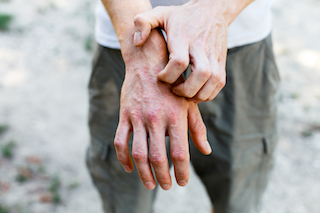
An interesting link has been found between the common skin condition known as eczema and suicide. According to a new study published in JAMA Dermatology, those who suffer from eczema are at a higher risk for suicidal thoughts and suicidal attempts.
“We were interested in seeing whether patients with eczema (atopic dermatitis) had higher risk of suicidality (suicidal thoughts, suicide attempts, and completed suicides) when compared to those without eczema,” study author, April Armstrong told us. Armstrong is a professor of dermatology (clinical scholar), at the Keck School of Medicine of the University of Southern California. “Previous studies have found that eczema creates a profound physical and psychological burden on patients."
Armstrong explains that eczema sufferers may experience debilitating symptoms of itch, burning, pain, and sleep loss. They may also experience feelings of shame, stigma, and embarrassment due to the visibility of their disease. The burden that eczema sufferers experience may be detrimental to their mental health and lead to a higher risk of suicidality. She and her colleagues hypothesized that eczema was associated with suicidality.
According to the World Health Organization, over 800,000 die by suicide each year which equates to one person every 40 seconds. It’s the second leading cause of death for those aged 15 to 29.
“In clinic, we have noticed that eczema can take a heavy toll on the mental health of our patients,” Armstrong told us. “Many of our eczema patients lose hope in improving from their disease and begin expressing thoughts of suicide. This clinical finding motivated us to study the association between eczema and suicidality. We hoped to clarify this association and begin making strides towards improving the mental health of those who suffer from eczema.”
According to the National Eczema Association, two thirds of people with eczema say the condition interferes with their daily life including employment and household management. A whopping 40 per cent of adults with eczema said that they refused an employment opportunity because of their eczema.
“The current literature on the association between eczema and suicidality has been inconclusive,” Armstrong told us. “We hoped to clarify this association through a meta-analysis. We carefully synthesized the available studies on suicidality in eczema sufferers. We pooled and analyzed data from 15 different studies to determine whether eczema patients had a higher risk of suicidality.”
From their meta-analysis of 310,000 eczema patients and 4.4 million people without eczema, Armstrong and her colleagues found that eczema patients had a 44% higher risk of suicidal thoughts and a 36% higher risk of attempting suicide. Armstrong says that because of the known physical and psychological burden of eczema, she and her fellow researchers anticipated that there would be an association between eczema patients and suicidality. The results of the study confirmed their hypothesis.
“Suicide is a major health concern that affects millions of patients and their loved ones,” Armstrong told us. “We believe our results emphasize a need for dermatology providers and loved ones to pay closer attention to signs of suicidality in eczema sufferers. We hope that our results will eventually lead to updates of the eczema treatment guidelines to include mental health screenings.”
The economic impact of eczema in the United States is estimated to be $5.3 billion according to the National Eczema Organization. The costs associated with eczema include medical costs as well as indirect costs such as interference with employment.
“We hope that dermatology providers find our suicide screening recommendations practical and helpful,” Armstrong told us. “Through vigilant mental health screenings of eczema sufferers, we may be able to provide proper care to those at risk of suicide and prevent suicides from occurring.”
Patricia Tomasi is a mom, maternal mental health advocate, journalist, and speaker. She writes regularly for the Huffington Post Canada, focusing primarily on maternal mental health after suffering from severe postpartum anxiety twice. You can find her Huffington Post biography here. Patricia is also a Patient Expert Advisor for the North American-based, Maternal Mental Health Research Collective and is the founder of the online peer support group - Facebook Postpartum Depression & Anxiety Support Group - with over 1500 members worldwide. Blog: www.patriciatomasiblog.wordpress.com
Email: tomasi.patricia@gmail.com